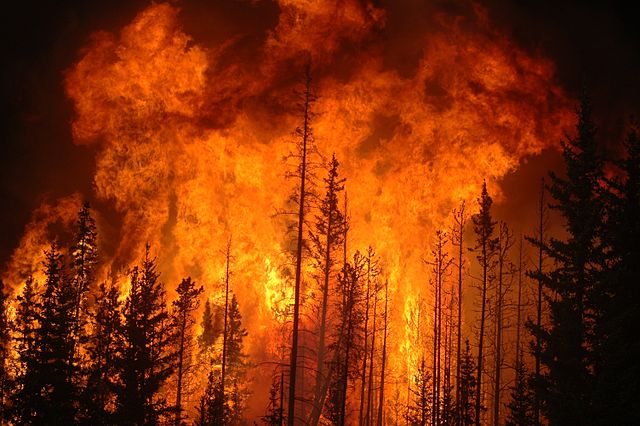
Leading climate scientists have issued a stark warning, stating that the extreme weather events witnessed around the world in 2023, including heatwaves, wildfires, and floods, could become the new norm within a decade if dramatic climate action is not taken.
These experts, comprising over 40 scientists from various parts of the globe, have underscored that the current experiences are just the “tip of the iceberg” compared to the even more severe effects that lie ahead. They attribute the limitations in climate models to the world “flying partially blind” into the future.
The global temperature increase aligns with decades of prior warnings and is further exacerbated this year by the resurgence of the El Niño climate pattern. However, experts emphasise that people and regions are more vulnerable to extreme weather than previously anticipated, leading to unprecedented impacts as climate records are shattered.
“July was the hottest month in human history and people around the world are suffering the consequences,” said Prof Piers Forster at the University of Leeds, UK. “But this is what we expected at [this level] of warming. This will become the average summer in 10 years’ time unless the world cooperates and puts climate action top of the agenda.”
“The impacts are frighteningly more impactful than I – and many climate scientists I know – expected,” said Prof Krishna AchutaRao at the Indian Institute of Technology.
Dr Christophe Cassou, a CNRS researcher at the Université Paul Sabatier Toulouse III, in France, said: “Changes in [climate] hazards have not been underestimated at global scale. But the impacts have been underestimated because we are much more vulnerable than we thought – our vulnerability is smacking us in the face.”
Throughout 2023, numerous records for heat and wildfires have been broken worldwide, from North America and Europe to Asia.
“Our perception is also biased by the fact that we are living more often in uncharted territory, which gives a sense of acceleration,” said Cassou. “We now feel climate change that is emerging above usual weather.”
While climate models have accurately projected the rise in global temperature, predicting extreme weather events has proven particularly challenging due to their rarity.
“We may be seriously underestimating the dangers ahead,” said Dr Raúl Cordero, until recently at the University of Santiago, Chile. “We are flying partially blind on what to expect for climate extremes.”
The scientists are resolute in stating that the world has not yet crossed a tipping point into runaway climate change, but they warn that these tipping points are drawing closer. They believe there is still a “tiny window” of opportunity to avert the worst of the climate crisis. The consensus among researchers is that the most critical action to take is to drastically reduce fossil fuel consumption to zero.
“The extremes we see now happening could induce tipping points such as the collapse of the Atlantic meridional overturning circulation and melting of the Antarctic ice sheets, that would have devastating impacts.”
“We need to stop burning fossil fuels,” said Dr Friederike Otto at Imperial College London. “Now. Not some time when we’ve allowed companies to make all the money they possibly can.”
Prof Emily Shuckburgh at the University of Cambridge in the UK said: “Anyone in any way perpetuating the fossil fuel era is firmly on the wrong side of history.”
“Knowing that we will look back on today’s extreme events as mild relative to what lies in our future is truly mind-boggling,” said Prof Andrea Dutton at the University of Wisconsin-Madison, US. “The speed at which we make this transition will define the future that we get.”
The UN is convening a climate ambition summit on 20 September. “Almost all our indicators on climate are pointing in the wrong direction,” said Amina Mohammed, the UN’s deputy secretary general. “The World Meteorological Organization has warned that the next five years are likely to be the hottest on record, hitting vulnerable communities the hardest.
“We hope and expect that [political] leaders, the private sector, and civil society organisations, will come to the summit with credible and ambitious actions and commitments.”
The United Nations’ primary climate summit of 2023, Cop28, is scheduled to commence in late November, hosted by the United Arab Emirates and presided over by Sultan Al Jaber, the CEO of the UAE’s state oil company. Global carbon emissions have continued to rise in recent years, but they must decrease by 43% to have a reasonable chance of keeping global heating below 1.5°C.
——————————————————————————
At Natural World Fund, we are passionate about stopping the decline in our wildlife.
The decline in our wildlife is shocking and frightening. Without much more support, many of the animals we know and love will continue in their decline towards extinction.
When you help to restore a patch of degraded land through rewilding to forests, meadows, or wetlands, you have a massive impact on the biodiversity at a local level. You give animals a home and food that they otherwise would not have had, and it has a positive snowball effect on the food chain.
We are convinced that this is much better for the UK than growing lots of fast-growing coniferous trees, solely to remove carbon, that don’t actually help our animals to thrive.
This is why we stand for restoring nature in the UK through responsible rewilding. For us, it is the right thing to do. Let’s do what’s right for nature!
Donate today at https://naturalworldfund.com/ and join in the solution!

